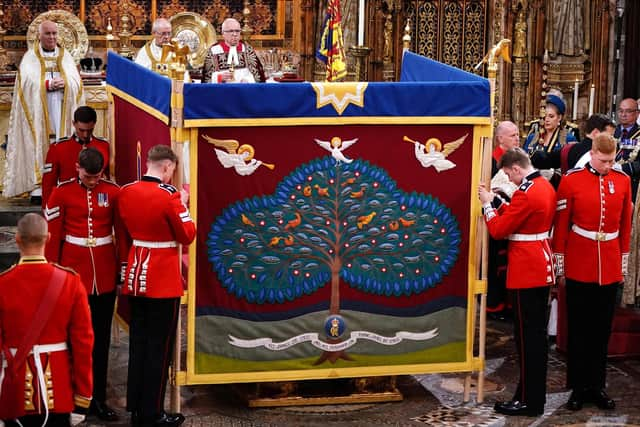King Charles needs to keep some royal mystery or the monarchy's popularity may slump – Alastair Stewart
We've all woken up at one time or another feeling like death, head in our hands, struggling to process the sheer extravagance of a weekend that got out of hand. As the dust settles, the nation's credit card shows a £250m overdraft for a monarchy splurge. Why does the Royal Family endure?
Portraits and pictures of our 1,000-year relationship with royalty generally look resplendent. Even grainy old footage of the late Queen Elizabeth II at her coronation in 1953 is manifestly majestic and wrapped in an aura of continuity and charm.
Advertisement
Hide AdAdvertisement
Hide AdThe coronation of King Charles III felt decidedly vain and, in some places, utterly ludicrous. Its absurdity was less to do with the pomp and ceremony and everything to do with the justification of political power. During a cost-of-living crisis, there was no mystery, no magic, just the sight of an unelected man in a publicly owned crown. The ceremony felt like a pale imitation of days long gone when the British Empire controlled dominions, colonies, protectorates, mandates, overseas possessions and trading posts across a quarter of the world at its zenith, all in the name of the monarch.
Smoke and mirrors are the basis for hereditary political muscle in Britain. Nostalgia turned into political reality. That our last three sovereigns have been benign and generally lean into fluffy affability does not change the fact that their power supposedly stems from the Divine, as if we lived in a theocracy. What is left if you remove the closed-door nature of spirituality and reduce it to an ordinary Saturday TV programme?
This is not a new concern. Winston Churchill's second Conservative government was apprehensive and downright against allowing television cameras to film the late Queen's Coronation. "Certainly," as Churchill said to Parliament in October 1952, "it would be unfitting that the whole ceremony, not only in its secular but also in its religious and spiritual aspects, should be presented as if it were a theatrical performance."
His words echoed the general warning from 1867 by political essayist Walter Bagehot in his book, The English Constitution. He contended there are two parts to the British constitutional system – “those which excite and preserve the reverence of the population – the dignified parts… and next, the efficient parts – those by which it, in fact, works and rules”.
“Mechanical arrangements”, as Churchill called TV, launched decades of unedifying scrutiny into every aspect of royal life. We are now all too aware that the Royal Family is as beset by scandal, divorce and arguments as every other family in the land. The most significant difference beyond wealth and power is the seemingly never-ending number of “sources close to” who are more than happy to reveal the inner workings of 'The Firm’.


No amount of religious or martial ceremony around the coronation can undo the erosion of the monarchy in this respect. As Bagehot noted, “above all things our Royalty is to be reverenced, and if you begin to poke about it you cannot reverence it… Its mystery is its life. We must not let in daylight upon magic.”
That is the essence of the British monarchy. The monarch exists because of God, and commands their ministers and our armed forces on that basis and at public expense. No amount of beneficial soft power in tourism and diplomacy can get away from that.
Once there was a genuine aura around royalty because public glimpses were so rare. For much of the last millennium, the populace was illiterate and told what to think by a convergence of religion and politics. Failing that, good old-fashioned brute force did no harm either.
Advertisement
Hide AdAdvertisement
Hide AdEdward VIII may have wrought scandal and precipitated a constitutional crisis over his relationship with Wallis Simpson, but his grandfather Edward VII was a well-known bounder and cad. "Dirty Bertie" was heir apparent to the British throne for almost 60 years, and his debauchery and scandal kept gossip mills in business for years. If the Royal Family had been as transparent and as public as it is today, Bertie would have destroyed the whole institution. King Charles is the first sovereign in our history whose personal life has been documented to death with not a sliver of regal mystique left.
As much as one points out its erroneous function, the monarchy does not endure because of power, religion or even fear. It survives because losing something old evokes reactionary instincts. Nostalgia is a universal enforcer of the status quo.
At the core of this is the same sensation most of us have about heirlooms. Some harmless old box, sitting in a corner, taking up space, occasionally costing money to maintain but ultimately only slightly intrusive. Do I bin that old thing to make space for a more practical modern amenity? Or can I afford not to have it when I know it sat in my great-grandparents' house? Will a twang of regret wound me horribly if I do away with it?
Polling is irrelevant. Protesting is meaningless. How do you get rid of something beloved by your grandparents without feeling as if you've betrayed some invisible generational link? However, the more that is revealed from behind closed doors, the more that’s modernised, the more royalty is made out to be ordinary, relatable, just like you and me, the more the mystique fades, and the privilege and power become too stark to ignore.
That is a warning to King Charles and his successors: never mind the new Carolean Age, in this Digital Age, they risk destroying themselves by revealing too much. And, if nothing else, Katy Perry singing 'Firework' at the Coronation Concert may have stirred the ghost of Guy Fawkes.
Comments
Want to join the conversation? Please or to comment on this article.